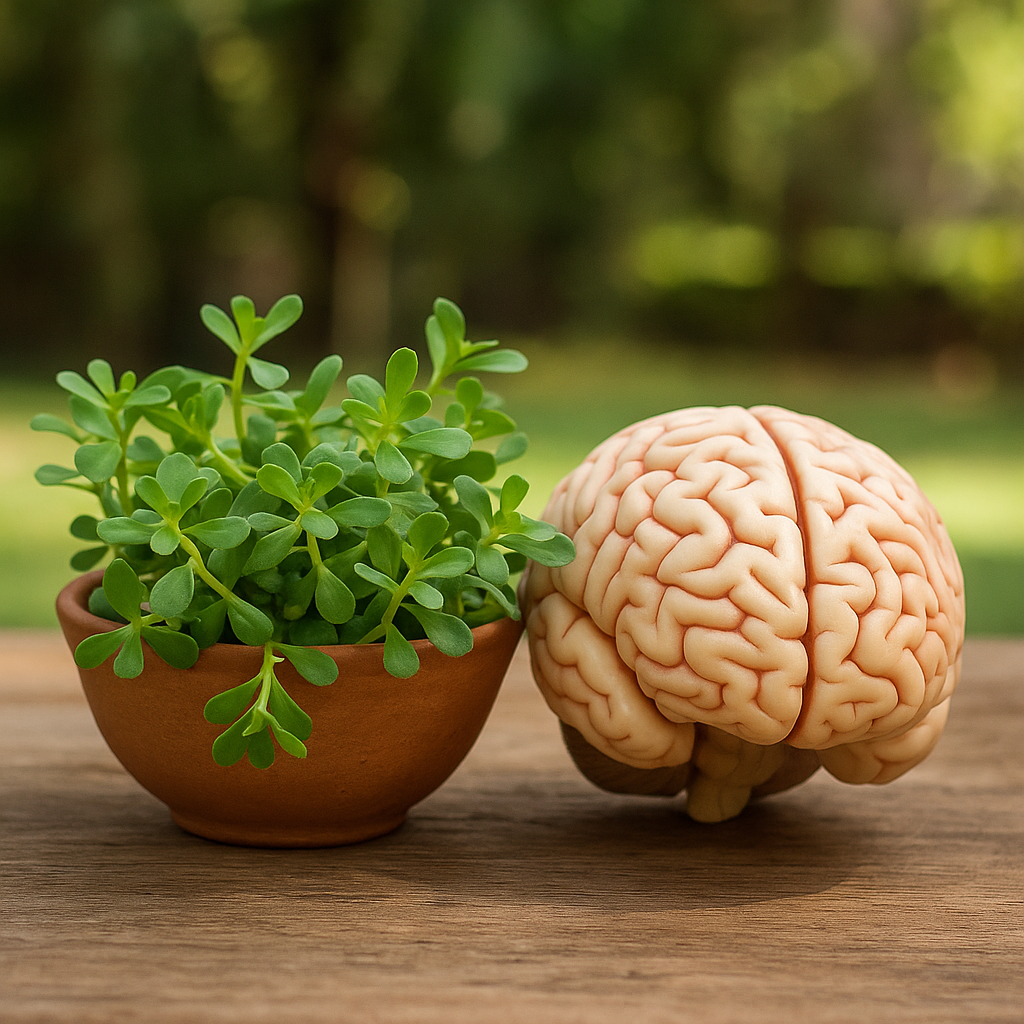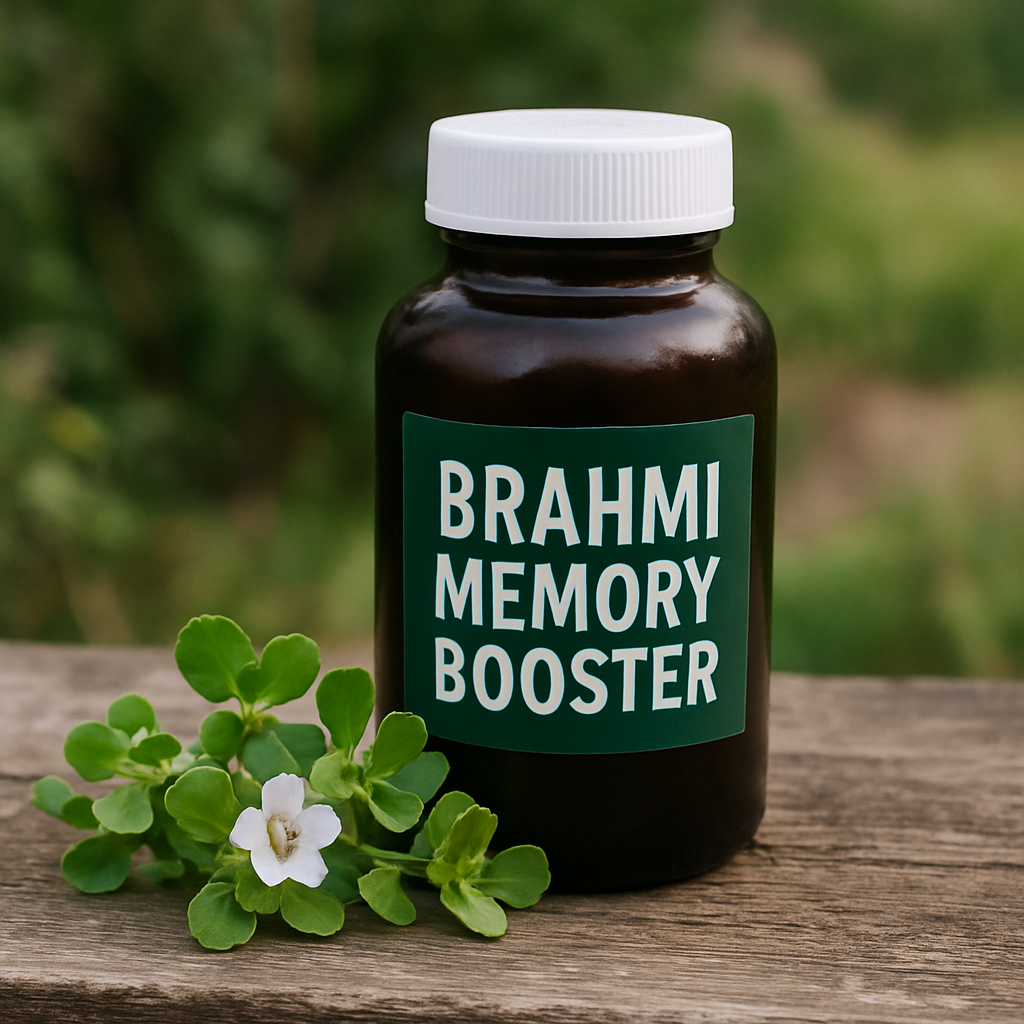How to Eat Brahmi Leaves for Memory and Brain Function

If you’re searching for a natural way to boost your brainpower, you’ve probably heard about brahmi. This traditional herb has long been used in Ayurvedic medicine to enhance mental clarity and memory. But many wonder: how to eat brahmi leaves for memory effectively? Is brahmi good for brain health, and does it really work as a brahmi memory booster?
In this article, we’ll explore what brahmi is, why it’s so valued for cognitive function, and practical ways to incorporate it into your daily routine for improved memory and brain power. Whether you're curious about brahmi for brain benefits or want to understand the best way to use this herb, keep reading to discover everything you need.

What Is Brahmi and Why Is It Good for the Brain?
Brahmi, also known as Bacopa monnieri, is a creeping herb found mainly in wet and marshy areas of India and other parts of Asia. Traditionally, it’s been considered a powerful herb for enhancing mental function and calming the nervous system. But what exactly makes it so beneficial for brain health?
Brahmi for Brain Function and Mental Clarity
Brahmi is widely recognized as a nootropic—meaning it supports and improves brain function. It contains active compounds called bacosides, which have been shown to promote neuron repair and improve communication between brain cells. This helps improve memory, concentration, and even mental clarity.
People who use brahmi often report reduced brain fog and better ability to focus on tasks. So if you’ve wondered, “does brahmi increase memory?” science suggests it can by enhancing how your brain processes and retains information.
Ayurvedic View on Brahmi for Memory Power
In Ayurveda, brahmi is classified as a medhya rasayana, a rejuvenator of the intellect and nervous system. It’s traditionally prescribed to improve memory power, reduce anxiety, and balance the body’s energies or doshas (vata, pitta, and kapha).
Ayurvedic texts recommend regular use of brahmi to maintain sharp mental faculties, especially for those suffering from forgetfulness or mental fatigue. Its calming properties are thought to soothe the mind and promote restful sleep, which indirectly supports better memory.
How to Eat Brahmi Leaves for Memory Improvement
Now that you know why brahmi is good for brain health, you might be asking: how to use brahmi leaves for memory enhancement?
Fresh brahmi leaves are often considered the best way to get the full benefits of the herb. Many people chew the fresh leaves directly or juice them to enjoy a concentrated dose of nutrients. The taste can be a bit bitter or earthy, so some mix the leaves with honey or add them to smoothies for easier consumption.
If fresh leaves aren’t available, dried brahmi powder is a common alternative. This can be mixed into warm water, milk, or tea to create a drinkable memory booster. Capsules and extracts are also widely available but may vary in potency.

How to Eat Brahmi Leaves for Memory and Brain Function
How to Safely Eat Brahmi Leaves Daily
If you’re thinking about adding brahmi to your routine, it’s important to know how to eat brahmi leaves for memory safely to avoid any unwanted effects. Fresh brahmi leaves can be eaten directly—usually 5 to 10 leaves daily, preferably in the morning on an empty stomach. Chewing the leaves releases the active compounds straight into your system.
For those who find the taste too bitter, mixing fresh leaves with a teaspoon of honey or blending them into fruit juices and smoothies is a great option. Juice extraction from the leaves is another popular method: you crush the leaves, strain the liquid, and drink it fresh. This offers a potent and fast-acting memory boost.
If fresh leaves aren’t accessible, dried brahmi powder is a convenient substitute. A typical dose ranges from half a teaspoon to one teaspoon daily mixed with warm milk or water. Some people also prefer brahmi capsules for ease of use, but be mindful to choose a high-quality product to ensure effectiveness.
Dosage and Duration for Brain Benefits
The effects of brahmi are not instant but build gradually with regular use. Scientific studies often recommend standardized extracts of around 300 to 450 mg daily to observe improvements in memory and focus over several weeks.
When using fresh leaves, since potency varies naturally, starting with a small amount and observing your body's response is wise. With consistent use, many notice enhanced mental clarity, quicker recall, and reduced anxiety.
When to Avoid Brahmi or Consult a Practitioner
Although brahmi for memory power is generally safe, some individuals should exercise caution. Pregnant and breastfeeding women are advised to avoid brahmi unless a healthcare professional recommends it, due to limited safety data.
People with thyroid disorders should consult their doctor because brahmi might influence thyroid hormone levels. Also, if you’re on medications affecting the nervous system — like sedatives, antidepressants, or anti-anxiety drugs — check with your healthcare provider before starting brahmi.
High doses of brahmi may cause mild side effects such as nausea, dry mouth, fatigue, or stomach upset. If these occur, reduce the dosage or take a break until symptoms subside.
Brahmi as a Natural Memory Booster
Brahmi is widely regarded as a gentle but effective natural memory booster. Its ability to enhance communication between neurons and calm the mind makes it popular among students, professionals, and elders looking to improve cognitive function naturally.
Besides memory improvement, brahmi’s anxiolytic properties reduce stress, which often hampers focus and mental performance. So, it’s not just a memory enhancer but a holistic brain tonic that helps overall mental wellness.
How to Eat Brahmi Leaves for Memory and Brain Function
Easy Ways to Incorporate Brahmi Leaves into Your Daily Life
Wondering how to use brahmi leaves for memory in your everyday meals? Here are some practical ideas:
-
Fresh brahmi smoothie: Blend fresh brahmi leaves with fruits like banana or apple, add honey for sweetness, and a splash of water or coconut water for a refreshing brain booster.
-
Brahmi tea: Dry the leaves or use brahmi powder to brew a soothing tea. Add lemon or ginger for taste and extra antioxidants.
-
Raw in salads: Toss fresh brahmi leaves into your salads for a subtle bitter flavor and an extra nutrition punch.
-
Juice: Extract juice from fresh leaves and drink it first thing in the morning for a concentrated dose of brain benefits.
-
With honey: Chew fresh leaves with a spoonful of honey to offset bitterness and enhance palatability.
These simple options make it easy to add brahmi into your routine without much hassle.
Common Misconceptions About Brahmi and Memory
There’s quite a bit of hype around brahmi as a brahmi memory booster, so it’s important to clear up some common myths:
-
Myth: Brahmi works immediately. Reality: Brahmi’s benefits build gradually over weeks of consistent use, not overnight.
-
Myth: More brahmi means faster results. Reality: Excessive intake can cause side effects and doesn’t speed up benefits. Moderation is key.
-
Myth: Brahmi cures all brain problems. Reality: Brahmi supports brain health but is not a cure for serious neurological diseases or memory disorders. Professional advice is needed for such conditions.
Understanding these facts helps set realistic expectations for your brain health journey.
Conclusion
Brahmi has stood the test of time as a trusted herb for enhancing memory and brain function. Whether you chew fresh leaves, drink brahmi juice, or take it as powder or capsules, regular and mindful use of this herb can support sharper focus, better recall, and a calmer mind.
If you’re curious about how to eat brahmi leaves for memory and brain health, start small, be consistent, and pair it with a healthy lifestyle to get the most out of its benefits. Always consult with a healthcare provider if you have any health concerns or are on medication.
Ready to give your brain a natural boost? Try incorporating brahmi into your routine and watch your memory and mental clarity improve over time.
If this article helped you, share it with others who might benefit from a natural brain boost!
FAQs
How often should you eat brahmi for mental benefits?
Daily consumption, typically once a day, is recommended. Benefits build gradually, so consistent use over several weeks or months is key.
Is brahmi good for memory in students and elderly people?
Yes, brahmi supports memory and cognitive health in both young learners and older adults by improving focus and slowing cognitive decline.
What’s the best way to take brahmi: powder, juice, or fresh leaves?
Fresh leaves are often considered most potent, but powder and juice are convenient alternatives. Choose whichever fits your lifestyle and preference.
Got any more questions?
Ask Ayurvedic doctor a question and get a consultation online on the problem of your concern in a free or paid mode.
More than 2,000 experienced doctors work and wait for your questions on our site and help users to solve their health problems every day.

